
Hi Connor great to meet you, can you give our readers some background information on yourself please?
Hi there. Honour to be here. I’m an actor and a writer based in Wales. I was born and raised in Newport. I trained as an actor at Trinity Saint David in Carmarthen and graduated with a degree in 2013. Since then as an actor I have worked in both theatre and TV with companies such as Taking Flight Theatre, BBC Wales, Fluellen Theatre, National Theatre Wales, Sherman Theatre and more recently Omidaze.
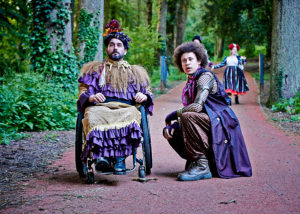
Connor in As You Like It, Taking Flight Theatre Company .
Photo by Jorge Lizalde
As a writer I have been commissioned by National Theatre Wales, Dirty Protest, Avant Theatre and No Boundaries. I am a member of National Youth Theatre of Great Britain, a member of National Theatre Wales’ TEAM Panel and I’m also the winner of the 2015 Welsh MonologueSlam run by Triforce Creative.
http://monologueslamuk.com/monologueslam-uk-comes-to-cardiff/
So what got you interested in acting?
I think it was the chance to play different characters and explore, create and escape to new worlds whilst in my late teenage years. I had a lot of anger and frustration back then and drama gave me a creative outlet. A way to channel that into acting.
You are an actor can you explain how this role operates within the creative team on a theatrical production ?
On a theatrical production an actor is the one that brings the characters to life and speaks the words written in the script. They bring the characters from the paper to the stage. We attend rehearsals and work with the director and other members of the team such as vocal coaches, choreographers, lighting and sound designers, stage managers and many more to rehearse the piece for a certain amount of time and bring it all together so it’s a polished piece ready for audiences.
You are currently working on a new version of the classic play Romeo and Juliet which is being produced by Omidaze Productions. Do you think Shakespeare is still relevant to todays audiences?
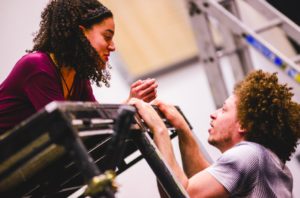
The Romeo and Juliet Company in rehearsals
I believe Shakespeare is still relevant. He was a playwright and wrote stories with various themes and many of those stories still resonate with audiences today, the themes remain and we still experience them (Wether you are dealing with grief like Hamlet, Prejudice like Othello, Betrayal like Macbeth or falling in love like Romeo.)
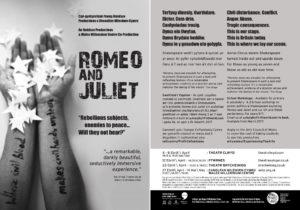
Take Romeo & Juliet for example, yes it’s the classical love story of two young lovers but amongst that we have two families who have been feuding for years. That conflict is still relevant to today’s audience. Be it not between two families but even two countries. All you have to do is pick up a newspaper or turn the TV on and conflict is among us. People rebelling, people fighting and just like in Romeo & Juliet, unnecessary people get hurt and dare I say killed as a result of that conflict. The more you delve into Shakespeare’s stories the more you unlock and the more you then find that you can relate to on a human level. We are all human after all and we all feel emotion on different scales. Shakespeare highlighted many issues which I believe are still present in today’s society that why his stories still get told.
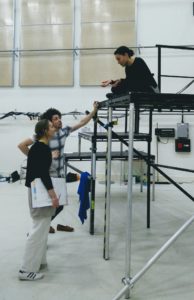
The Romeo and Juliet Company in rehearsals
Get the Chance works to support a diverse range of members of the public to access cultural provision Are you aware of any barriers to equality and diversity for either Welsh or Wales based artists or specifically writers?
Theatre is a reflection of life and every life is different.
Not every life is white.
I recently tweeted #walestheatreawardssowhite which was the case (and my frustration at the time) as the last three awards now since 2015 have had all white winners in all the acting and directing categories. I would like to delve deeper into my reasons for this. I think Alexandria Riley this year was the first BAME nominee in a lead actress category (and rightly so!) but that in itself is wrong because there is an abundance of BAME talent here in Wales and it isn’t being utilised. I obviously realise that this issue goes far beyond awards and is a reflection of something greater in society.
For me diversity and representation is so much bigger than just skin colour. It’s gender, sexual orientation, disability, social status and more.
We live in a multi-cultural world and this isn’t being represented on stage. We need audience members from different backgrounds and generations to go to the theatre and see theatre they can relate to. If we don’t see ourselves or our culture on stage (and screen for that matter) how are we meant to be engaged. If young people don’t see themselves represented on stage they won’t go to the theatre, if they don’t see themselves represented on TV they’ll turn the TV off. We have to show all walks of life to engage all people.
Every life is different after all.
To quote Viola Davis (who is an actress I am hugely fond of)
“The only thing that separates women of colour from anyone else is opportunity: you cannot win an Emmy for roles that are simply not there”
For minority actors to be considered for awards they have to be cast in productions. So it stretches to the casting directors, directors, theatre companies to be imaginative and widen their casting pools. Think outside the box when it comes to casting. BAME playwrights to write more stories so their voices are being heard. Their voices need to be heard for the work to be made. And once the work is made they can be in contention for things like awards.
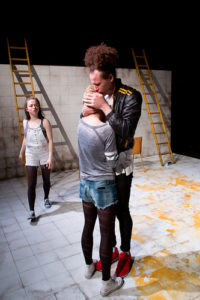
Connor in Bird, Sherman Theatre/Manchester Royal Exchange
It’s the vision of bold people like Directors Yvonne Murphy, Rachel O’Riordan, Elise Davison and Casting Directors like Sophie Parrott that allow me to stand here today fulfilled with the opportunities I’ve been given so far in my career.

Directors Yvonne Murphy, Rachel O’Riordan and Elise Davison
It’s the vision of these people and many more that break these boxes and allow diversity and representation to flourish. They don’t see risk, all they see is talent. And we need more people to think on that same wavelength for real change to occur.
Diversity has become this big taboo as of late and all I see it as is the ‘why cant’. Why can’t Iago be a black actor?(which has happened now to some criticism) why can’t Juliet be a disabled actress? Why can’t James Bond be an actor of colour? or Doctor Who be a woman?
Talent is everywhere in all shapes and sizes. So we have to make an effort to go and seek this talent out. Look for it. Everywhere.
Young people are the next generation. The next generation of voices to be heard. The next actors, directors, playwrights and producers. If they don’t have anything to relate to when they watch the arts then how can we inspire them to be the next generation of change? We have to inspire them. We have to empower them and by doing that we secure a fighting chance for a diverse and equal future in the arts.
Do you feel the situation is the same for English speaking Welsh actors?
I feel there is a lack of diversity for English speaking Welsh actors especially on TV but I feel it’s different from Welsh language actors. I can’t comment too much as I’m not a Welsh language actor. But even in Wales there is more English speaking work being produced than there is Welsh speaking so Welsh language actors are already at a disadvantage.
If you were able to fund an area of the arts in Wales what would this be and why?
If I were to fund an area of the arts in Wales it would have to be showcasing new writing from younger talent of all backgrounds (say 18-25) as I believe they have so much to say about the world and at times not the tools necessary to get their voices heard. The fund would allow them to all come together in a space once a week for let’s say four months. Partnered with an arts organisation or producing theatre or even just a group of actors it would give them the tools to be mentored by experienced professional writers, hone their craft, get their voices heard and shake things up drastically with their take on the world. It also gives them the chance to hear their text spoken by actors and try new ideas out to see what works and what doesn’t. At the end of the four months the theatre would showcase their writing with a series of performances to paying audiences. It would give actors the chance to work on new, fresh writing and younger generations of writers to be nurtured and mentored along the way by having more established writers like your Gary Owens’, Katherine Chandlers, Matthew Bulgos, Kelly Jones’ and Nicola Reynolds’ running sessions with them about writing stories and what that entails. Ultimately it’s giving the next generation a great stepping stone into the industry and new voices are given a platform.

Writers Gary Owen, Katherine Chandler, Matthew Bulgo, Kelly Jones’ and Nicola Reynolds.
What excites you about the arts in Wales? What was the last really great thing that you experienced that you would like to share with our readers?
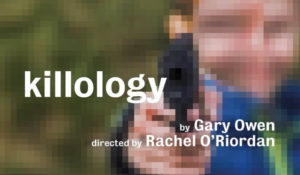
What excites me has to be its potential. There are such great companies and artists making great work at the moment like Gary Owen’s return to the Sherman with Killology, Hijinx and their unstoppable MeetFred, National Theatre Wales taking over Cardiff with the City of the Unexpected and the Other Room going from strength to strength with every show they do. Even smaller companies like Critical Ambition, Avant Theatre and No Boundaries are all striving forward and raising that bar. All this gives me confidence for the future of Welsh arts and for the next generation of artists in Wales because right now Wales is living up to its potential of being a beacon of influential, thought provoking work that will inspire and mesmerise audiences.
Tour Dates for Romeo and Juliet
Mold Theatr Clwyd 5-8 April
Llanelli The Ffwrnes 12 April
Brecon Theatr Brycheiniog 23 April
Cardiff WMC 27 April-14 May
http://www.omidaze.co.uk/artistic
Thanks for your time Connor

It was lovely to hear your views on the questions you were asked and the passion shows how strong you feel by the answers given. Good luck with the show xxx
Thanks for your comments Helen